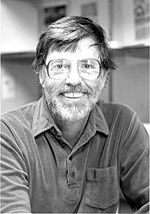Campus News
In Memoriam: Robert S. Edgar (1930-2016)
Robert Edgar, professor emeritus of biology at UC Santa Cruz, died peacefully in his Santa Cruz home on Monday, February 1. He was 85. Edgar made significant contributions in two areas of molecular biology–the genetics and self-assembly of viruses and the genetics of a tiny worm, the nematode Caenorhabditis elegans, which Edgar helped establish as […]

Robert Edgar, professor emeritus of biology at UC Santa Cruz, died peacefully in his Santa Cruz home on Monday, February 1. He was 85.
Edgar made significant contributions in two areas of molecular biology–the genetics and self-assembly of viruses and the genetics of a tiny worm, the nematode Caenorhabditis elegans, which Edgar helped establish as one of the most useful model organisms for biological research. He was a member of the National Academy of Sciences and a fellow of the American Academy of Arts and Sciences.
Edgar earned his bachelor’s degree at McGill University in Montreal and Ph.D. in biology at the University of Rochester. As a professor of biology at the California Institute of Technology, he did pioneering research in molecular biology, studying a virus that infects bacteria (known as bacteriophage T4). He received the Molecular Biology Award from the National Academy of Sciences for this work in 1965.
In 1970, Edgar came to UC Santa Cruz as founding provost of Kresge College. His primary focus initially was on undergraduate education and the establishment of the new college. But he also continued his research, and he became interested in C. elegans as a model system for studying developmental biology. He played a leading role in the community of researchers studying this important organism.
Edgar also had a role in the beginnings of the Human Genome Project as a key participant in the 1985 workshop organized by Robert Sinsheimer, then chancellor of UCSC, to explore the feasibility of sequencing the human genome. The Santa Cruz workshop planted the seed for what later became the International Human Genome Project.
Edgar is survived by his partner of 40 years, Carol Proudfoot-Edgar; his two sons, Bruce and Chris Edgar; and two grandsons, Nico and Noah.
Read the full obituary published in the Santa Cruz Sentinel.